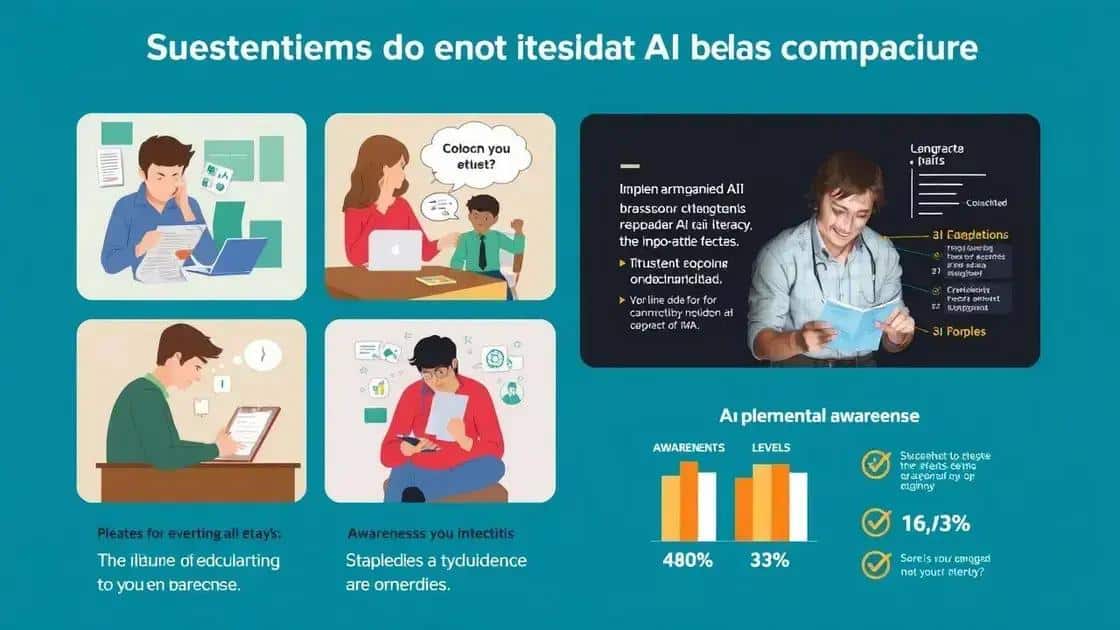AI literacy campaigns trends: what’s shaping the future?

AI literacy campaigns are crucial for equipping the workforce with essential knowledge and skills to navigate the technology-driven job market, addressing challenges like resource limitations and the need for collaborative efforts among stakeholders.
AI literacy campaigns trends are increasingly vital as technology advances. Have you noticed how these initiatives are reshaping education and workforce skills? Let’s dive into what’s happening and how it impacts us all.
Emerging trends in AI literacy campaigns
The world of AI literacy campaigns is constantly evolving. New trends are emerging, helping educators and organizations understand how to teach this vital skill.
Focus on Practical Skills
One major trend is the emphasis on practical skills. It’s not just about theory; learners need hands-on experience with AI tools. This approach helps individuals grasp how artificial intelligence works in real scenarios.
Collaboration Between Sectors
Another significant trend is the collaboration between educational institutions and tech companies. By working together, these sectors can provide resources like workshops, online courses, and live demonstrations.
- Workshops led by industry experts
- Access to AI tools for students
- Easy-to-follow online courses
- Real-world case studies in classrooms
Moreover, there is a growing trend of integrating AI literacy into K-12 education. Schools recognize the importance of teaching younger generations about technology and its implications.
Through these changes, students develop critical thinking skills that will serve them well throughout their lives. The ability to understand AI concepts helps them navigate a future where technology plays a central role.
Regular Updates and Assessments
Another trend involves the frequent updating of curriculum. As AI technology advances, so should the teaching materials. Regular assessments ensure that learners are not only engaged but also retaining the information needed to succeed.
By implementing these diverse strategies, AI literacy campaigns are making a notable impact on how people view and use technology. This adaptability is key in preparing individuals for an AI-infused workplace.
Importance of AI education for the workforce

Understanding the importance of AI education for the workforce is essential in today’s job market. With technology advancing rapidly, workers must adapt to new tools and methods.
Skills for Future Jobs
AI education equips individuals with the skills needed for future jobs. Companies are increasingly looking for candidates who understand how to work alongside artificial intelligence. This knowledge improves employability and career growth.
Enhancing Problem-Solving Abilities
Furthermore, learning about AI enhances problem-solving abilities. Workers can apply AI solutions to real-world challenges, making them valuable assets to their organizations.
- Ability to automate repetitive tasks
- Developing critical thinking skills
- Improved adaptability to change
- Effective collaboration with AI technologies
As employees gain experience with AI tools, they become more innovative. This innovation drives businesses forward, leading to better products and services. When workers are educated in AI, whole teams can thrive.
Moreover, organizations that invest in AI education see better outcomes. They foster a culture of continuous learning and adaptability, which is crucial in a tech-driven world. Companies that prioritize AI education often enjoy a competitive edge.
Meeting Industry Standards
Finally, keeping pace with industry standards demands an understanding of AI. Many sectors, from healthcare to finance, integrate AI into their operations. Employees who are trained in this area enhance their ability to meet these evolving demands.
This makes AI education vital not only for personal growth but also for organizational success in a digitally connected future. Teams equipped with AI knowledge can navigate complex challenges effectively.
Key stakeholders in promoting AI literacy
Identifying the key stakeholders in promoting AI literacy is essential to the success of these initiatives. Different groups play a crucial role in shaping how individuals learn about artificial intelligence and its applications.
Educational Institutions
First, educational institutions are vital players. Schools and universities design programs that introduce students to AI concepts. They create curricula that engage and prepare future workers for a tech-driven job market.
Government Agencies
Another key group includes government agencies. They often launch initiatives that promote AI education statewide or nationally. These programs provide funding and resources to help schools incorporate AI literacy into their teaching.
- Grants for schools to develop AI courses
- Public awareness campaigns about AI’s importance
- Workshops and training sessions for educators
- Partnerships with tech companies to provide resources
Additionally, industry leaders have a significant influence on promoting AI literacy. Companies are increasingly recognizing the need for a skilled workforce. They often collaborate with schools and universities to offer internships and real-world experiences.
These partnerships help students gain practical skills, making them more competitive in the job market. As businesses evolve, their needs change, and they look for employees who understand AI technologies.
Nonprofit Organizations
Nonprofit organizations also play a role in advancing AI literacy. They often create free resources and training for underrepresented groups, ensuring that AI education is accessible to everyone. Their mission typically focuses on bridging the gap between technology and education for all.
By engaging these various stakeholders—educational institutions, government agencies, industry leaders, and nonprofits—the promotion of AI literacy becomes a collaborative effort. Together, they can empower individuals to navigate a world increasingly influenced by technology.
Challenges faced in implementing literacy campaigns

Implementing literacy campaigns focused on AI presents several challenges. These obstacles can hinder efforts to educate individuals of all ages about artificial intelligence and its importance.
Lack of Resources
One major challenge is the lack of resources. Many schools and organizations do not have the funding needed to create effective AI literacy programs. This limits their ability to provide training, materials, and technology.
Inadequate Training for Educators
Furthermore, inadequate training for educators is a significant issue. Many teachers may not have enough knowledge about AI to teach it effectively. Without proper training, they cannot guide students or answer questions confidently.
- Limited access to AI materials and tools
- Shortage of qualified instructors
- Insufficient professional development opportunities
- Difficulty integrating AI into existing curricula
Another challenge is varying levels of awareness among students. Some may have heard of AI but do not understand its implications well. This gap in knowledge makes it hard for campaigns to reach everyone effectively.
Moreover, societal perceptions of AI can hinder literacy campaigns. Some people fear that AI will take jobs or are skeptical about its use. These attitudes can create resistance to learning about the technology, making it essential to address these concerns directly.
Technology Accessibility
Additionally, technology accessibility remains a barrier. Not all students have access to computers or reliable internet at home. This digital divide can prevent individuals from fully participating in AI literacy programs.
By identifying and addressing these challenges, literacy campaigns can adapt their strategies. This helps ensure that more people have the opportunity to learn about AI and how it affects their future in a technology-driven world.
FAQ – Frequently Asked Questions about AI Literacy Campaigns
Why is AI literacy important for the workforce?
AI literacy is crucial as it prepares individuals to work effectively alongside emerging technologies and enhances their employability.
Who are the key stakeholders in promoting AI literacy?
Key stakeholders include educational institutions, government agencies, industry leaders, and nonprofit organizations that collaborate to enhance AI education.
What challenges do AI literacy campaigns face?
Challenges include lack of resources for training, inadequate teacher preparation, and varying levels of awareness among students.
How can collaboration improve AI literacy initiatives?
Collaboration among various stakeholders leads to better resource sharing, increased funding, and more comprehensive educational programs.





